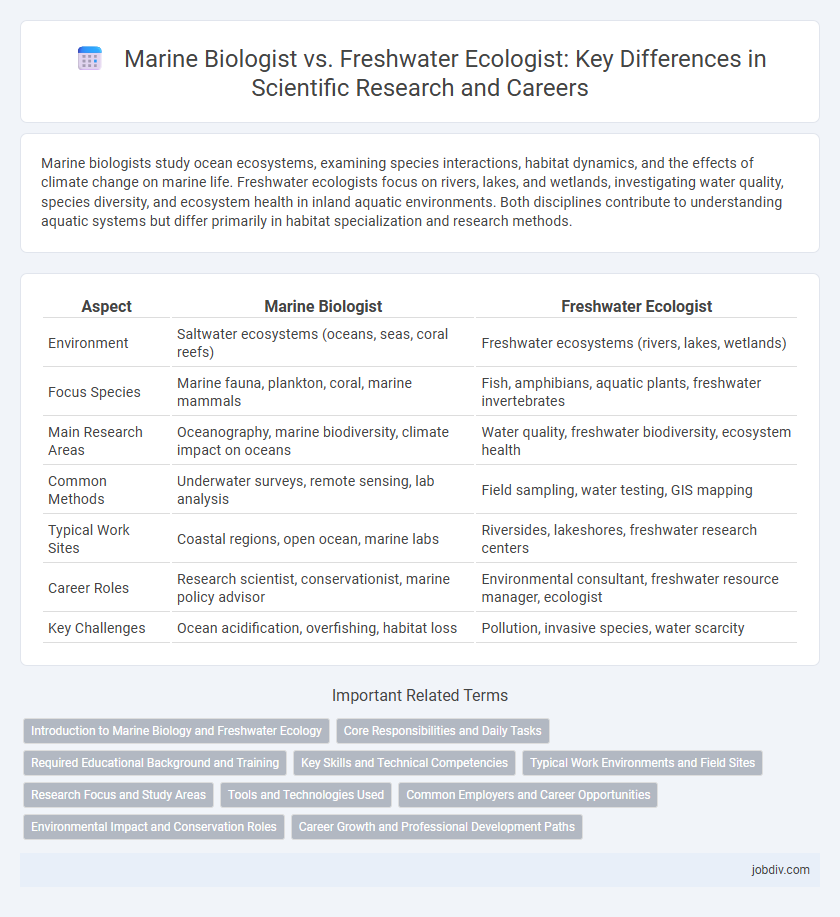Marine biologists study ocean ecosystems, examining species interactions, habitat dynamics, and the effects of climate change on marine life. Freshwater ecologists focus on rivers, lakes, and wetlands, investigating water quality, species diversity, and ecosystem health in inland aquatic environments. Both disciplines contribute to understanding aquatic systems but differ primarily in habitat specialization and research methods.
Table of Comparison
| Aspect | Marine Biologist | Freshwater Ecologist |
|---|---|---|
| Environment | Saltwater ecosystems (oceans, seas, coral reefs) | Freshwater ecosystems (rivers, lakes, wetlands) |
| Focus Species | Marine fauna, plankton, coral, marine mammals | Fish, amphibians, aquatic plants, freshwater invertebrates |
| Main Research Areas | Oceanography, marine biodiversity, climate impact on oceans | Water quality, freshwater biodiversity, ecosystem health |
| Common Methods | Underwater surveys, remote sensing, lab analysis | Field sampling, water testing, GIS mapping |
| Typical Work Sites | Coastal regions, open ocean, marine labs | Riversides, lakeshores, freshwater research centers |
| Career Roles | Research scientist, conservationist, marine policy advisor | Environmental consultant, freshwater resource manager, ecologist |
| Key Challenges | Ocean acidification, overfishing, habitat loss | Pollution, invasive species, water scarcity |
Introduction to Marine Biology and Freshwater Ecology
Marine biologists study the diverse organisms and ecosystems in saltwater environments such as oceans and coral reefs, examining marine life adaptations and ecological interactions. Freshwater ecologists focus on species and habitats in lakes, rivers, and wetlands, analyzing water quality impacts and biodiversity in these inland aquatic systems. Both fields utilize principles of ecology, biology, and environmental science to understand ecosystem dynamics and inform conservation strategies.
Core Responsibilities and Daily Tasks
Marine biologists study ocean ecosystems, analyzing marine organism behaviors, physiology, and the impact of environmental changes on marine biodiversity. Freshwater ecologists focus on inland aquatic systems such as rivers, lakes, and wetlands, assessing water quality, species interactions, and habitat restoration efforts. Both professions involve field sampling, data collection, and ecological modeling but differ in the specific aquatic environments and organism types they prioritize.
Required Educational Background and Training
Marine biologists typically require a bachelor's degree in marine biology, oceanography, or a related field, with advanced positions necessitating a master's or Ph.D. emphasizing marine ecosystems, ocean sciences, and aquatic organisms. Freshwater ecologists usually hold degrees in ecology, environmental science, or biology, focusing on freshwater habitats such as rivers, lakes, and wetlands, often supported by specialized training in hydrology and freshwater conservation techniques. Both careers demand fieldwork experience, laboratory skills, and familiarity with ecological research methods tailored to their respective aquatic environments.
Key Skills and Technical Competencies
Marine biologists possess expertise in oceanographic research, species identification, and marine ecosystem monitoring, utilizing skills such as SCUBA diving and remote sensing technology. Freshwater ecologists excel in hydrological analysis, water quality assessment, and habitat restoration, with proficiency in GIS mapping and bioassessment protocols. Both fields demand strong analytical abilities, fieldwork experience, and data modeling capabilities tailored to either marine or freshwater environments.
Typical Work Environments and Field Sites
Marine biologists primarily conduct research in oceanic environments including coastal waters, coral reefs, and deep-sea habitats, often using research vessels, underwater submersibles, and remote sensing technology. Freshwater ecologists focus on inland aquatic ecosystems such as rivers, lakes, wetlands, and streams, utilizing field stations, water quality labs, and portable monitoring equipment to study freshwater biodiversity and ecosystem health. Both professions require extensive fieldwork but differ significantly in their target habitats and methodological approaches to aquatic ecosystems.
Research Focus and Study Areas
Marine biologists specialize in studying ocean ecosystems, focusing on saltwater species, marine habitats, and the impact of environmental changes such as ocean acidification and climate change on marine biodiversity. Freshwater ecologists concentrate on rivers, lakes, and wetlands, investigating freshwater species, water quality, and ecosystem dynamics affected by pollution, sedimentation, and invasive species. Both fields employ techniques like population monitoring and habitat assessment but differ fundamentally in their study environments and species adaptations.
Tools and Technologies Used
Marine biologists utilize advanced tools such as remotely operated vehicles (ROVs), sonar mapping systems, and underwater sensors to study ocean ecosystems and marine life behavior. Freshwater ecologists rely on water quality testing instruments, sediment samplers, and bioassessment tools to analyze river, lake, and wetland environments. Both fields employ Geographic Information Systems (GIS) and data modeling software to map habitats and predict ecological changes.
Common Employers and Career Opportunities
Marine biologists commonly find employment with oceanographic institutions, environmental consulting firms, governmental agencies such as NOAA, and aquariums. Freshwater ecologists often work for environmental protection agencies, water resource management organizations, universities, and conservation nonprofits. Both fields offer research positions, environmental impact assessment roles, and opportunities in ecological restoration projects.
Environmental Impact and Conservation Roles
Marine biologists study ocean ecosystems, focusing on the impacts of climate change, pollution, and overfishing on marine biodiversity to develop conservation strategies that protect coral reefs, marine mammals, and fisheries. Freshwater ecologists analyze the health of rivers, lakes, and wetlands, addressing threats such as nutrient pollution, habitat fragmentation, and invasive species to maintain water quality and preserve freshwater biodiversity. Both experts contribute to environmental impact assessments and conservation planning, ensuring sustainable management of aquatic resources critical for ecosystem services and human livelihoods.
Career Growth and Professional Development Paths
Marine biologists experience career growth through research positions in oceanography institutes, marine conservation agencies, and academia, often advancing by specializing in marine ecosystems, marine species, or climate impact studies. Freshwater ecologists pursue professional development via roles in environmental consulting firms, government water resource departments, and non-profit conservation organizations, focusing on freshwater biodiversity, pollution control, and habitat restoration techniques. Both fields offer opportunities for interdisciplinary collaboration, publication in peer-reviewed journals, and participation in international conferences to enhance expertise and career progression.
Marine Biologist vs Freshwater Ecologist Infographic

 jobdiv.com
jobdiv.com